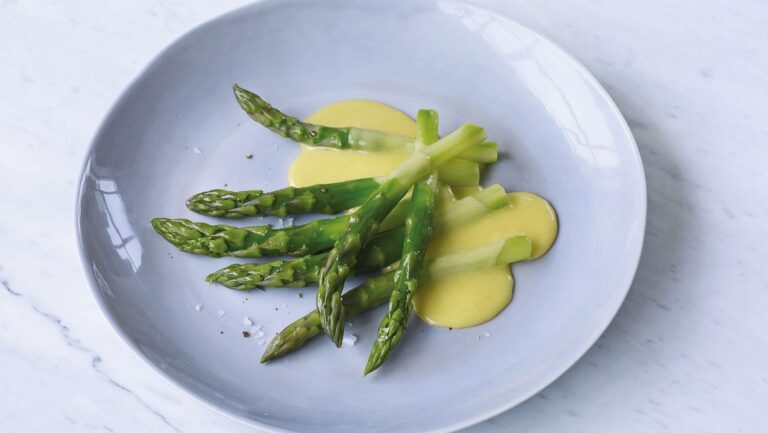Ingredients
Instructions
Makes 150-200ml
½ shallot
50ml white wine vinegar
50ml water
200g unsalted butter, chilled
Few drops of lemon juice
Salt and ground white pepper
- Peel and finely dice the shallot and put it in a small saucepan with the wine vinegar and water. Place over a medium heat and slowly reduce the liquid by at least two-thirds. Strain to remove the shallots.
- Cut the butter into 1cm cubes and keep chilled and firm. Put ¾ tbsp reduction in a small saucepan and, over a gentle heat, add a cube of cold butter. Using a small sauce whisk, incorporate the butter into the reduction as vigorously as you can. The sauce requires constant, vigorous whisking.
- As the butter melts fully, add another cube of butter, repeating the vigorous whisking. Continue in this manner until the sauce is starting to thicken and at least half the butter has been added. Now the butter can be added a little more quickly, all the while ensuring the saucepan is not getting too hot, as overheating will split the sauce. Make sure the sauce heats up between additions of butter.
- Once all the butter has been added, the sauce should be pale, with a creamy consistency. Taste and season with more reduction, lemon juice, salt and ground white pepper. The sauce will keep briefly, but not for long; it is usually made just before serving.
Variations
For a more classical version, substitute a dry white wine in the reduction for the
wine vinegar.
Mustard beurre blanc – Stir ½–1 tbsp wholegrain mustard into the finished sauce.
Chicken beurre blanc – Substitute 100ml chicken and veal stock (see page 96) for
the water in the reduction, and reduce to 1 tbsp.
Fish beurre blanc – Proceed as for the chicken beurre blanc, but with fish stock
(see page 100) instead of chicken and veal stock in the reduction.
Creating the emulsion
This is more difficult when making a beurre blanc, because no egg yolk is involved. The cold butter must be vigorously whisked into the reduction to disperse it as finely and evenly as possible as it slowly melts: this is what creates the emulsion. Butter that is not cold will melt too quickly and you will not be able to disperse it quickly enough into the reduction, resulting in a split or thin sauce. For the sauce to thicken, the butter must not be added too quickly, which is why each cube of butter must be fully incorporated before the next is added. Adding the butter
too quickly initially will result in a thin sauce that is difficult to thicken later on. Only once at least half the butter has been added and a double cream consistency has been achieved can the butter be added a little more quickly, but still carefully. Overheating the emulsion will split it.
Stabilising a beurre blanc
To stabilise a beurre blanc, once the reduction is made, add 1 tbsp double cream and reduce again by about half. Strain, then whisk the butter in.
Balancing the flavour of emulsion sauces
All the basic emulsion sauce recipes use fat, acidity and sometimes egg yolk. It is important in making and finishing the sauces that they are balanced in terms of flavour, even before other flavourings are added. Where egg yolk is included in the base, enough oil or butter must be added to balance the eggy flavour, which is especially noticeable with raw eggs. With so much oil or butter, enough acidity is required to
balance the cloying nature of the fat. Acidity is generally added in the form of vinegar or lemon juice. Reducing vinegar softens the harshness of it, but the underlying acidity base is still present. The process of balancing the flavour of the fat begins in the early stages of making the sauce, with the addition of a little reduction or lemon juice. In the final balancing and seasoning of the sauce both reduction and lemon juice can be used, as well as salt and pepper, as the tastebuds react to different forms of acidity in different parts of the mouth. If a sauce is a little too acidic, try adding a little more salt, and vice versa.
A note on unsalted butter…
It is very important to use unsalted butter in a hollandaise or beurre blanc, as salted
butter will over-season the sauce.
